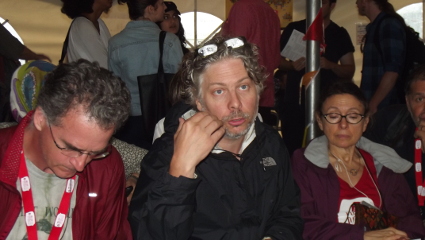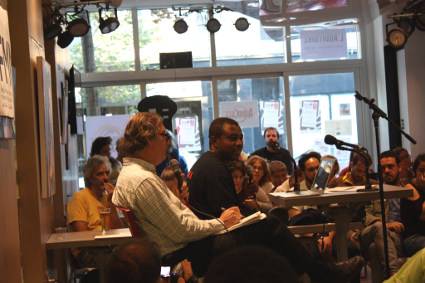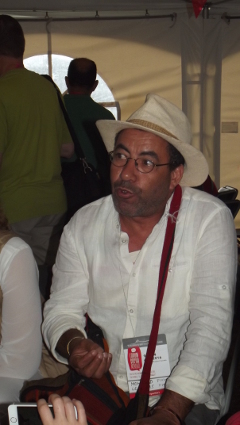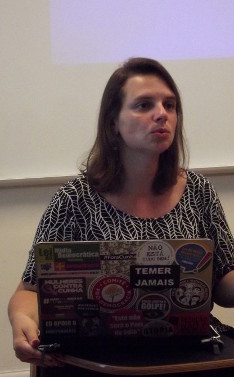Removing trash radio from Quebec
How do you describe a radio whose programs propose to remove the undesirables from Quebec through means such as, “to castrate and deport migrants”? [2] The term “trash radio” is not excessive when this media seems unabashed in the way it opens space for all types of hate propaganda (against Muslims, people on social assistance, indigenous communities, homosexuals, etc.). Unfortunately, these radios are popular with many listeners in Quebec, especially in Québec City and surrounding areas, which are known to be very right-wing. The Facebook page for the trash radio Radio X- CHOI station is liked by 43,000 people. “Trash radios are not that way because of ideology, but since they want to attract the largest number of people, they go for controversy,” explains Stéphane Couture, communications professor at York University and member of the World Forum of Free Media (WFFM).

To deal with these populist radio stations, a collective compiled a number of critiques on trash radio in a blog, and radio stations ran advertising campaigns calling for a boycott of trash radio. But this counter-speech did not have much impact because, according to Stéphane Couture, “as long as the left and the media that battle oppression do not adopt a more popular and accessible discourse, they will not have the audience necessary to dismantle these trash radio programs.” As is the case in many other countries, free media in Quebec lacks funding, and their failure to successfully form a united front prevents them from applying collectively for government funding.
Community radio and attacking Trump-ism

In the United-States, the mainstream media did not hide their contribution to the rise of Donald Trump. “They did it more for money than for ideology, by making fun of this candidate who was becoming a caricature of himself,” says Sphynx Eben, a founding member of Indymedia Africa, who lives and works in the United States. For this communications activist, the role of community radio stations has been central in denouncing the populism of this presidential candidate. Radios like Wort FM have become spaces to organize the fight against the extreme right. “Community radios focused their actions on university campuses, to engage the left and to organize student protests that, for example, were able to cancel a speech by Trump in New York City, and a public event in Chicago,” recounts Sphynx. Their very horizontal mode of organization gave these radios structure and power across the country. Despite these successes, Sphynx recalls that the free media in the United States are not as strong and creative as they were in the 2000s: “The renewal of the Patriot Act in 2011 has increased mistrust of social movements and free media, which are suffering today from a great shortage of human and material resources”.
Maghreb-Machrek: encouraging tolerance against radicalizing discourse

In the Maghreb-Machrek region, hate speech is abundantly propagated by extremist groups calling for jihad. These groups have large financial means for their communication and benefit from private media relays: “Many satellite channels based in the West, most notably in London, repeat the hate speech of these terrorist groups and call the youth to radicalize,” states Mohamed Leghtas, coordinator of the information portal e-Joussour. During the 2015 World social Forum (WSF) held in Tunis, a “Maghreb-Machrek Coalition against Hate Speech and Promotion of Tolerance”, was formed by associations and medias to combat the threat of youth radicalization in the region. Its first action was to produce a video (in Arabic, a French version will follow), that was aired by all the free media in the region. As the instigator of a network of twenty or so community radio station projects in Morocco, e-Joussour plans to launch a call for projects in the near future to finance audiovisual, artistic and cultural productions against hate speech. Community radios have tackled this battle head on in the fight against radicalization and are using a lot of air time to discuss it. Their audience, however, is minimal in comparison to the audiences of Daesh (ISIS). For Mohamed Leghtas, this is not only due to the technological evolution that requires “human, technical and material means that we don’t have”, but also to the high illiteracy rate in certain areas. As a result, free media content does not always reach disadvantaged populations.
The political crisis renews the audience for Free Media in Brazil

Free media has developed considerably in Brazil since 2000. Whether they are led by professional journalists or by young social media users, the multitude of individual and decentralized initiatives has until now confined these medias to smaller audiences. But the current political crisis in Brazil is changing this. “Private media has always played a role in destabilizing the government. Indeed, every person who wants to save democracy is searching for alternative information,” explains Bia Barbosa, director of the social communication collective Intervozes. To cover demonstrations and provide analyses of the Temer threat, free media have bombarded social networking sites, creating streaming groups through apps such as Telegram and WhatsApp. Since the beginning of the crisis, the news collective Mídia Ninja has produced up to 300 news pieces a day. And the popular Brazilian Front has created its own information collective, bringing together over 200 organizations and journalists.
“Today, we are working like crazy to defend democracy, but once the crisis has passed, what will be left of this intense media activity?” asks Bia. Another concern: despite the success of alternative media, media concentration is well under way in Brazil. There is no strong public communication system or diversity policy for the programs. “Dilma [prime minister of Brazil] has met twice with blogger collectives but has never supported free media.” This situation is unlikely to improve with the current interim president. We will have to wait until the elections in 2018 for more a more favourable climate (or not!) …
